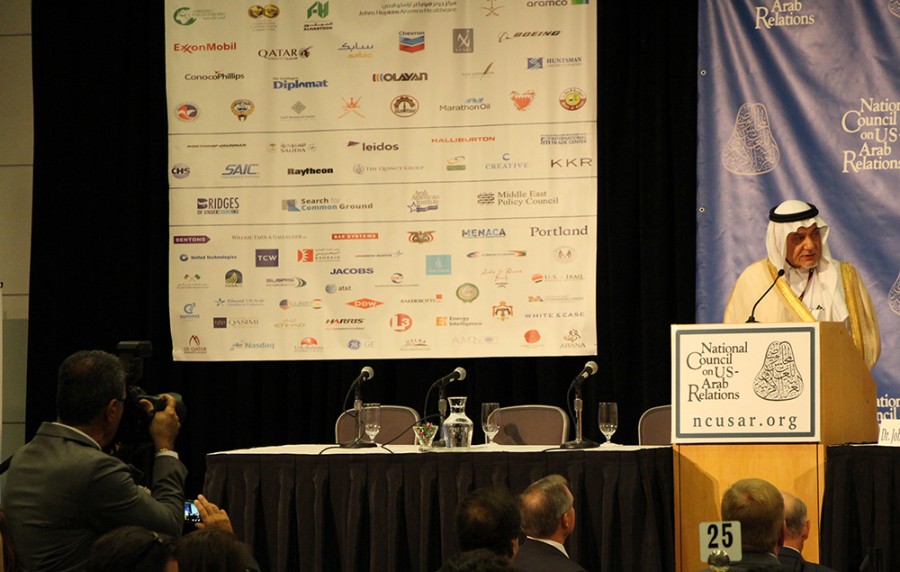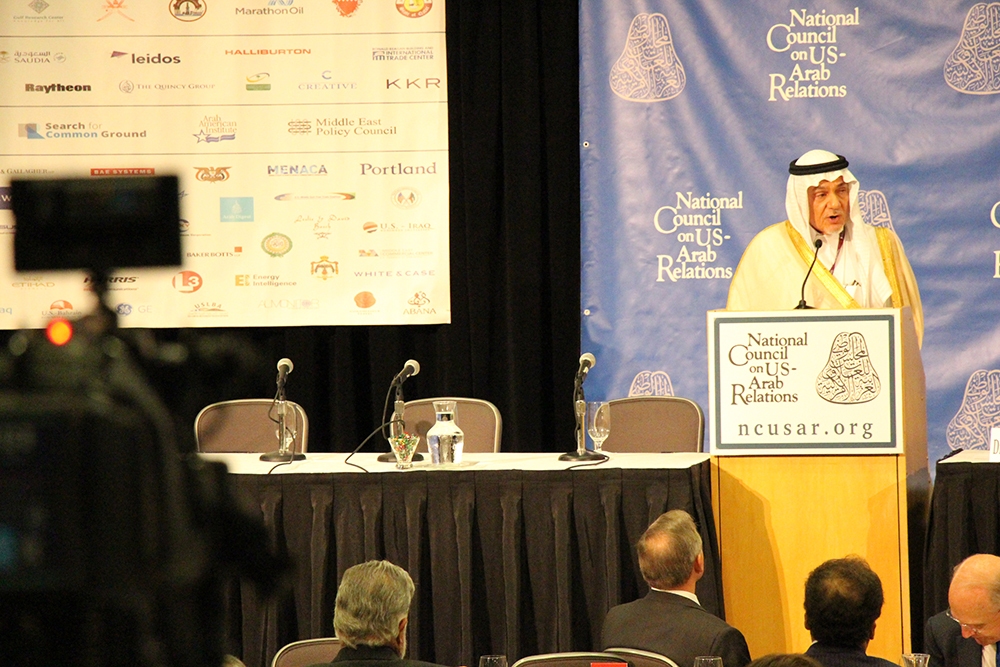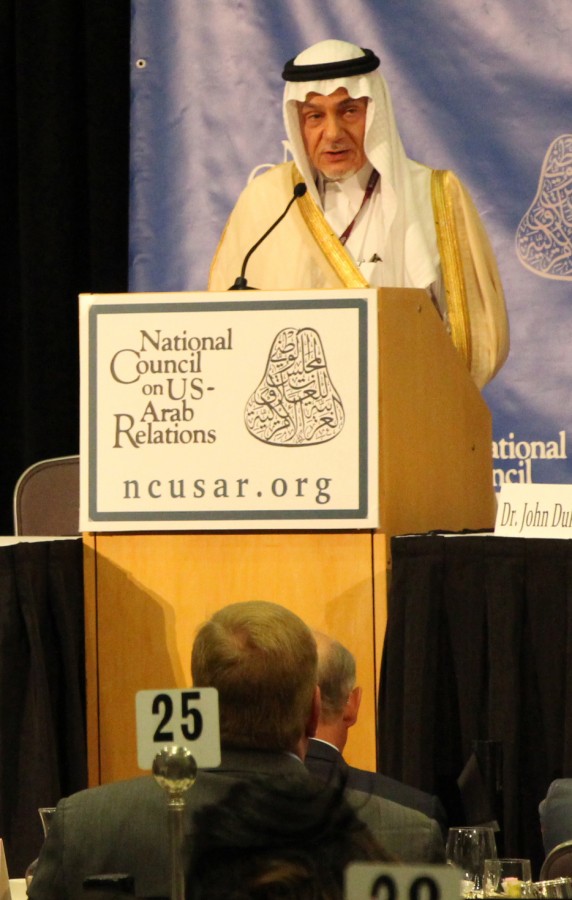In remarks to attendees at the Arab-US Policymaker’s conference in Washington, D.C. last week, HRH Prince Turki al-Faisal outlined a Saudi foreign policy with three central pillars before paying a heartfelt tribute to his brother, the former foreign minister who passed away earlier this year.
The remarks, included below, framed Saudi foreign policy around unity, stability, and responsibility.
On unity in the GCC, Prince Turki highlighted Saudi Arabia’s effort to bring together actions of the Gulf states behind shared interests. “In the past few years, the Kingdom has made a great effort to prioritize the oneness of the Gulf, and its shared interests, over small and transient differences,” the Prince said in the luncheon keynote address.
The second pillar of Saudi policy at home and abroad is stability. “The dust of the Arab unrest has never truly settled — instead, it has been swept into several nations and taken on new forms. In a region where the decay of regimes has created widespread human suffering, Saudi Arabia commits itself to policies which promote and sustain the integrity of just regimes and support citizens in embattled areas on their path to stability.”
The third and “most important” principle of Saudi Arabian foreign policy is responsibility: responsibility to itself, to the Middle East, to the Islamic community, and to the world.
The full transcript of the speech has been transcribed into text by our sister site SUSRIS and can be read in full below.
***
When the waves of Arab unrest began in 2010, the future of the Middle East seemed even more uncertain than it is today. In the midst of political turmoil, Saudi Arabia was forced to strengthen and clarify its own foreign policy. From that time on, the Kingdom structured its foreign policy leadership, and its vision for its own future, around these three words: unity, stability, and responsibility.
The unity that Saudi Arabia advocates, and the vision it promotes, is the unity of the Arab gulf: in the past few years, the Kingdom has made a great effort to prioritize the oneness of the Gulf, and its shared interests, over small and transient differences. In the struggle to restore the legitimate government to power, in Yemen, the Kingdom has succeeded in forging a coalition of the GCC countries and likeminded Arab and non-Arab countries to achieve that aim and prevent the usurpers of power, the Houthis and the forces of the deposed president, Ali Abdallah Saleh, from forcing themselves on the Yemeni people.
And as sectarian violence deepens rifts and breaks apart homes across the Arab world, Saudi Arabia’s call for unity has become more urgent than ever. Iraq and Syria are among the countries following the same heartbreaking narrative: citizens with the same shared history, the same ancient religion, and the same homeland being torn apart by radicalist groups exploiting sectarian divisions for their own gain. Groups like ISIS, and I call them Fahish, which in Arabic means obscene, the Shi’ite militias in Syria and Iraq, Hezbollah, and the Houthis hold out the texture of religious fanaticism in order to gain loyalty — by giving the young a militant identity, a sense of belonging and a vision for which to fight. But the unity of radicalism is an illusion: it cannot exist without an enemy. It reaches not towards harmony but towards domination and control. Fahish is the symptom of the disease of anarchy in Syria and Iraq. The disease lies in Damascus, where Bashar al Assad continues to murder his people with poison gas and barrel bombs.
Russia has now added to this bloody scene with air strikes that are aimed at the moderate opposition which is fighting both Fahish and Bashar. This is a most unwelcome addition to an already combustible situation. Russia says it is there to fight the terrorists. Alas, it and the US are ignoring the father of all terrorists in Syria; his name is Bashar al Assad. His victims count in the hundreds of thousands; whereas the victims of Fahish and all of the terrorists in all the world are numbered less than five thousand. In Baghdad, the legacy of Nuri al Maliki’s sectarian rule disenfranchised the Sunni Iraqis and allowed Fahish to take advantage of the vacuum caused by this to establish their rule in Mosul and other parts of Iraq. Fix Damascus and Baghdad, and Fahish will wither away.
Fighting sectarianism is far from easy. Sectarianism thrives on the enmity of others. The Kingdom has asked the Islamic countries in 2012 to build a center that will research and dismantle sectarian ideologies and promote intersectarian dialogue. But there is only so much that can be done for countries like Iraq and Syria, where sectarianism is still a valuable political currency and citizens are willing to trade national loyalty for narrow social and sectarian identity. The desire for unity must also come from within.
The quest for unity is in many ways a quest for safety and stability, which is why the second pillar of Saudi policy at home and abroad is stability. The dust of the Arab unrest has never truly settled — instead, it has been swept into several nations and taken on new forms. In a region where the decay of regimes has created widespread human suffering, Saudi Arabia commits itself to policies which promote and sustain the integrity of just regimes and support citizens in embattled areas on their path to stability.
The past year and a half has seen some Arab countries make progress towards political integrity. Tunisia held free elections for the first time since the Arab uprisings. Egypt is emerging from the tumult of the past few years under the leadership of al-Sissi, and a violent, painful period has produced a constitution for the embattled birthplace of the Muslim Brotherhood. After the success of the Presidential elections, Parliamentary elections will be held this year. The Egyptian people need a respite from the tumult of the last four years.
Bahrain, another state whose recent history has been marked by sectarian clashes and government-opposition tension, held a round of general elections in 2014. The Shi’i citizens of Bahrain elected representatives to the Parliament, despite the threats of the extreme Shi’i groups that tried to intimidate them. Saudi Arabia has been proud to play a role in stemming the threat of sectarian violence, and it will continue to focus its diplomacy on encouraging the development of strong regimes and integrated civil society across the Arab world.
The third and most important principle of Saudi Arabian foreign policy is responsibility: responsibility to itself, to the Middle East, to the Islamic community, and to the world. In the 20th century, the Kingdom accepted the momentous responsibility of custodianship of the Two Holy Mosques and stewardship of the haj: its role as the meeting place of the world’s Muslims and the preserver of its holy sites informs every aspect of public and private life. The tragic events of the death of so many pilgrims that marred this year’s pilgrimage do not release the Kingdom’s responsibility from dissecting the causes of that tragedy and guaranteeing that it never recurs. Efforts by Iran to make political capital out of the suffering that occurred demean the meaning of the pilgrimage; when Muslims stand together before God as equals in prayer, dress, and conduct. Their past attempts at smuggling explosives to disrupt this holy undertaking are well documented.
The Custodian of the Two Holy Mosques, King Salman declared on Monday that the Kingdom will not allow for any efforts to politicize a human tragedy. He also said that Saudi authorities are thoroughly investigating the event. As an Islamic leader, the Kingdom plays a special role in advocating for oppressed Muslims everywhere. Saudi Arabia is equally leading the efforts to stem extremist and heretical interpretation of Muslim faith as promoted by some from within the Kingdom and those outside the Kingdom.
Saudi Arabia has the wisdom of experience when it comes to fighting terrorism. It has fought extremists on its own soil for decades and developed some of the world’s most sophisticated counterterrorism techniques. The world can expect that Saudi Arabia will carry its advocacy of the welfare of Muslims will take first priority in negotiations with other regional powers. The Kingdom contributed half a billion dollars for the UN effort to resettle the refugees from the Fahish onslaught on Iraq. The Kingdom also contributes to fund the camps of Syrian refugees in Jordan, Lebanon, and Turki. We have also welcomed more than two million Syrians since 2011. Those who wanted residence permits were given them with all the benefits of schooling, health care and work, and those who wanted to move on were given temporary visas.
When it comes to the ongoing conflict in Palestine, Saudi Arabia commits itself to the responsibility of advocating for the dignity and independence of the Palestinian people. 2015 was a difficult and bloody year for Palestine. The wounds of the Israel-Palestine conflict are too deep to see healing soon. But just as we have just witnessed the raising of the Palestinian flag at the United Nations, it is Saudi Arabia’s hope that the coming months can move the world toward a unified, organized movement in favor of self-determination and peace in Palestine. Several European Parliaments have urged their governments to recognize the state of Palestine, and Sweden and the Vatican have extended that recognition, already.
The Kingdom also recognizes that part of its global responsibility is an attempt to mend relationships with its neighbors and to work through grievances in order to move toward a more productive future. Saudi Arabia welcomes the opportunity for further discussion of Iran’s nuclear program and the benefits it could bring to the Gulf. Diplomacy with Iran poses unique difficulties. The world must understand that Saudi Arabia has boundaries that cannot be crossed and loyalties that cannot be betrayed. The Kingdom cannot let the fight against ISIS, or Fahish, draw attention away from the atrocities of the Assad regime. A friend to Bashar al-Assad is an enemy of the Syrian people and to those who would help them. Unfortunately, Iran, and, now, Russia, have aligned themselves with Assad against the Syrian people. This is not just politically unwise, it is morally wrong.

In a tribute to his brother Prince Saud, Turki said “he served five kings, the Kingdom, the Arabs, the Muslims, and the rest of humanity without any complaint or inhibition.”
For Iran and Russia to put themselves on the side of the butcher Assad is to put themselves on the wrong side of history. The more than three hundred thousand Syrian souls who perished because of Assad will continue to haunt Khamin’i and Putin. The one billion and a half Muslims of the world will carry that grievance forever.
Alongside its spiritual role, Saudi Arabia has been blessed with the responsibility of natural resources: its vast oil reserves. The drop in oil prices has led to a great deal of speculation about the future of the oil industry and its impact on global policy. Some of this speculation has been measured and reasonable: the oil industry touches every part of the globe, and when changes occur, Saudi Arabia welcomes the opportunity to set the record straight and to explain to the world how its use of oil is in line with its values and its goals.
The Kingdom is the world’s largest exporter of oil and takes seriously its leadership role in the regulation of the oil market. Saudi Arabia has the reserves and the infrastructure necessary to weather a drop in prices, and the foresight to realize that OPEC’s days as a collective bargaining tool are limited. If there are some who are suffering from the drop in oil prices, they must realize that the market dictates those prices. When there is more oil in the market, prices go down. The reverse is equally true. That is economics one o one. The shale oil producers know this quite well. That is why they have shut down uneconomic wells and stopped developing others. When the prices go up again, they will rejoin the fray.
Some will see a conspiratorial flavor to the Kingdom’s treatment of these events. The fact is that Saudi Arabia, along with all the other producers, is protecting its share of the market. The Kingdom considers that oil is a resource, a tool for development, a bargaining chip to be used wisely in games of diplomacy and war. Saudi Arabia uses its oil resources for the betterment of its own society and as an impetus for political stability and economic growth region wide: its behavior in the oil market is meant to supplement its domestic and foreign policy. Historically, the Kingdom has always sought an equitable price for oil. It continues to do that, today.
Ladies and Gentlemen,
This year has been a year of sorrow for the Kingdom of Saudi Arabia. In January, our beloved King, Abdallah bin AbdulAziz died. The people mourned his passing because his legacy was one of accomplishment and reform. The fact that we are weathering the downturn of the price of oil is because under his leadership, the country accrued the amounts of financial reserves that are sustaining us.
King Abdullah bin Abdulaziz
Thanks to King Abdallah, in December, this year, women in Saudi Arabia will be voting to elect women representatives in our municipal councils. There is a whole panoply of issues undertaken by our beloved late King that if I were to enumerate them I will speak for the rest of the day.
King Salman has succeeded to the Custodianship of the Two Holy Mosques. As governor of Riyadh, Minister of Defense, and Crown Prince, he shared in all of the Kingdom’s development, reforms, and progress. His choices for Crown Prince and Deputy Crown Prince will see us for a stable and prosperous future. His meeting of the challenge of the Houthi overturning of the legitimate government by galvanizing the Arab and Muslim coalition to reverse that illegal action has defined his brave and steadfast style of leadership. His continuing support for the King Abdullah scholarship program is indicative of his faith in Saudi youth that they are our undepletable resource who will carry us forward in the future.
Ladies and Gentlemen,
On the night of the twenty third day of Ramadan, one of the holiest of days, on which, according to Muslim belief, God comes nearer to all Muslims to give them the assurance that he is listening to their supplications, He chose to take from us my beloved late brother, Saud. He was my mentor and my friend, and I sorely miss his wisdom and his wonderful sense of humor.
Prince Saud AlFaisal
For fifty years, forty of which he was Foreign Minister, he served five kings, the Kingdom, the Arabs, the Muslims, and the rest of humanity without any complaint or inhibition. Even when he was afflicted with Parkinson’s disease, he never shirked his work. Whenever we begged him to let up and take a breather, he would look at us, raise his eyebrows, and return to what he was doing; as if to say that he must finish what he was doing without interruption.
The buying of Aramco shares, the oil embargo, the effort to keep Egypt in the Arab fold after Camp David, the ending of the Lebanese civil war, the ending the Iran Iraq war, the wildlife conservation program, the galvanizing of world support for Kuwait after Saddam’s invasion, convincing Gorbachev not to impede the UN Security Council resolutions to sanction Saddam, the forecasting of the dire consequences of the American invasion of Iraq, the struggle to convince the world to stand up for the Syrian people, and the all-embracing and continuing political battle to gain for the Palestinians their right to freedom and self-determination, all of these events had the imprint of Saud AlFaisal.
The guidance of the five kings he served in all of these issues, and many other issues too numerous to mention here, was always the beacon that guided him.
I ask you, Ladies and Gentlemen to stand up for a minute of remembrance for King Abdallah, Prince Saud, and the martyrs of the crane accident in the Holy Mosque in Makkah and the stampede during the Haj.










